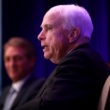Campaign Grammar—The dirty wars waged by right-wing despots in South and Central America turned the word “disappeared” into both a noun and a transitive verb. Here in the U.S. it appears that former Senator Phil Gramm is a desaparecido and that John McCain has disappeared him. One of the sponsors of the Gramm-Leach-Bliley Act of 1999, which eliminated the distinction between commercial and investment banks, Gramm was McCain’s economic adviser during the primaries and the early part of the current campaign. Gramm was also one of the Senate sponsors of the 2000 Commodity Futures Modernization Act, which makes derivatives trading almost impossible to regulate. Gramm was thrown off McCain’s bus a long time ago. Once it became evident that the global economic meltdown could not have happened without his work in the Senate, Gramm was disappeared.
The former Texas senator lives on, however, in news coverage. The October 15 Washington Postdescribes a critical moment in October 2000 when Gramm stalled the futures bill to hold out for language that would bar the Commodities Futures Trading Commission and the Securities and Exchange Commission from regulating the swaps market. A compromise salvaged the SEC’s anti-fraud authority but denied the agency rule-making authority. Derivatives, credit default swaps, collateralized debt obligations—the instruments that investment guru Warren Buffett calls “financial weapons of mass destruction”—escaped regulation because of Gramm’s work in the Senate. On a less reportorial front, CNN’s Anderson Cooper now has Gramm’s face on a Wanted poster in a nightly “Culprits of the Collapse” segment.
Then there is desaparecida Carly Fiorina, who floated away from Hewlett-Packard on a $42 million golden parachute after driving the company’s stock down fifty percent. Before Gramm and Fiorina were disappeared, McCain described Gramm as one of the finest economic thinkers he knows and said he was unaware of the details of Fiorina’s compensation package. If John McCain loses the election, much of the fault will be attributed to his inattention to detail and unwillingness to vet the people he brought into his campaign.
How Big a Market?—One estimate is that the swaps market is worth $62 trillion, more than twice the size of the New York Stock Exchange and four times the U.S. national debt. But the swaps market is so loosely regulated that no one actually knows its value. Eric Dinallo, the superintendent of the New York State Insurance Department, described the corruption of the unregulated swaps market in testimony before the U.S. House Committee on Oversight and Government Reform. “Credit default swaps can be used by the owners of bonds who want to protect themselves if the company that issued the bonds is unable to pay the interest and principal,” Dinallo said. “In those cases, the swap is insurance, because the swap buyer is like a homeowner insuring a home.” He added that most swaps are now purchased by third-party speculators who do not own bonds and are buying the swaps as wagers on a company’s ability to deliver. New York Governor David Patterson describes swaps trading as “gambling” and is moving to regulate swaps in New York.
Tobin-Tax Time—Named after Yale economics professor James Tobin (who died in 2002), the Tobin Tax was proposed as a tax on currency transactions when President Richard Nixon took the dollar off the gold standard. Applied to all securities transactions in today’s market, the Tobin Tax offers substantial revenue potential and would allow Wall Street to pay for some of the damage it has inflicted on the economy. Progressive economist Robert Pollin has been a proponent of a version of the Tobin Tax (see the Washington Spectator, Aug. 1, 2008). In a July interview with the Spectator, Pollin said such a tax would generate revenue and penalize speculation. (A day trader flipping one stock ten times a day would be taxed for each transaction.) Dallas Mavericks owner (and billionaire investor) Mark Cuban is flogging the Tobin Tax, observing that the New York Stock Exchange, the Nasdaq, the American Stock Exchange and the party-to-party OTC market trade two billion shares a day. Pollin explained his Tobin Tax provision more recently in The Nation, proposing to tax stocks, bonds, derivatives, mortgage-backed securities, short sales and, aware of the ingenuity of brokers and hustlers, “all new schemes.” Pollin predicts that such a tax could generate $100 billion a year, which could be used to create new jobs.



0 Comments